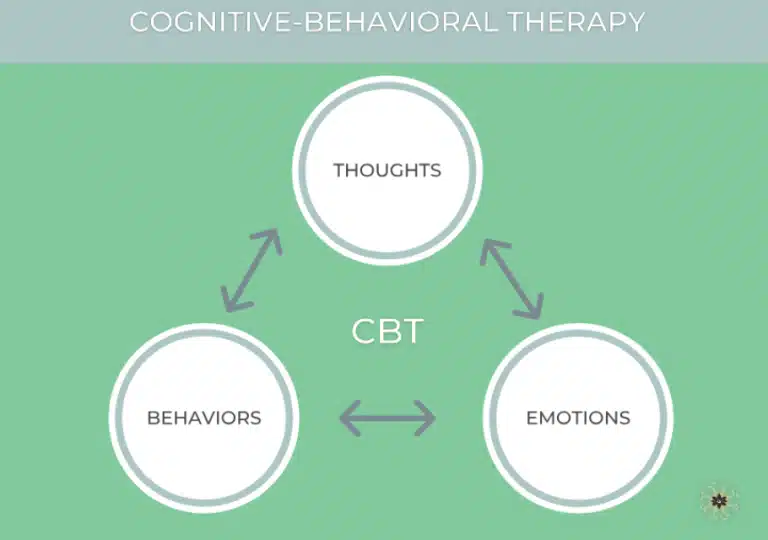Cognitive Behavioral Therapy NYC

Understand the connection between your thoughts, emotions, and behavior to live a happier, more peaceful life.
Imagine your mind as a computer. It processes endless information and performs multiple tasks, but it can also get bogged down with viruses and junk files (negative thoughts and behaviors). Over time, specific patterns of thinking, feeling, and behaving can become harmful cycles, impacting various aspects of your life. You may feel heightened stress, anxiety, irritability, or overwhelmed like a computer running slow due to malware. For example, if you’re constantly worried about future events, you may notice you struggle to focus on and complete tasks in the present moment. However, Cognitive Behavioral Therapy (CBT) is like an antivirus software for your mind. It helps identify and remove these harmful elements, optimizing your mental software for a calmer, balanced and more productive state. “CBT helps us develop insight into ourselves and interpret situations objectively. No longer judging ourselves with a negative outlook.” – Flor Villagran (Looking Glass NYC) And at Looking Glass NYC, we offer both in-person and online CBT to accommodate your lifestyle and needs. Whether you prefer the comfort of your own home or face-to-face sessions in our New York office, we make sure you receive the best care possible in achieving your mental health goals, no matter where you are.Working With CBT Therapists in NYC
Therapy isn’t one-size-fits-all; it’s a personalized journey where you work with a trained professional to find tools and strategies to handle life’s challenges with confidence and support. Our CBT therapists in NYC use proven techniques to help you spot and challenge negative thoughts, behaviors, and emotions. Together, we’ll reduce your symptoms, unlock your potential, and create lasting change. Ready to take the first step?
Browse our diverse team of experienced therapists, gain direct access to their calendars, and schedule a FREE 10-minute consultation.
What is Cognitive Behavioral Therapy?
Cognitive behavioral therapy (CBT) is a structured, goal-oriented therapy that focuses on how your thoughts, actions, and feelings interact. It’s like a cycle where each part affects the others. Much like the diagram below:
By identifying this cycle that’s holding you back, CBT allows you to improve your mental health and achieve greater overall well-being. For example, if you think, “I’ll never be good enough,” your sessions will help you challenge this thought and replace it with a more helpful thought like, “I have unique strengths and abilities.” This mindset shift empowers you to improve how you speak to yourself and tackle challenges with confidence, transforming your life in and out of therapy.
What Can You Expect During A CBT Session?
CBT in NYC teaches you to confront your concerns by understanding your negative thinking and behavior patterns. It begins by setting specific, short-term goals that lead to rapid and effective change. This dual approach ensures CBT is a practical tool for immediate improvement and long-term growth. Here’s what you’ll discover:
- Challenge Negative Thoughts: Replace problematic thoughts with helpful ones.
- Understand Relationships: Gain insight into your behaviors and motivations, which improves connections with others.
- Improve self-confidence:Understand and accept yourself better
- Problem-Solving Skills: Learn techniques to navigate difficult situations.
- Build Confidence:Confront fears directly instead of avoiding them.
- Role-Playing: Practice for stressful interactions to reduce anxiety.
- Mindfulness Techniques:Learn skills to calm your mind and body during stress.
CBT isn’t just about understanding the cycle between your thoughts, behaviors and emotions; it’s about enhancing your mental landscape and empowering yourself in everyday life. You hold the keys to releasing what’s no longer serving you and making space for the life you envision.

What Does Cognitive Behavioral Therapy Treat?
Cognitive behavioral therapy offers proven, evidence-based techniques designed to support individuals of all ages. It treats a wide range of mental health issues, including:

- Anxiety disorders
- Depression
- Obsessive-Compulsive Disorder (OCD)
- Post-Traumatic Stress Disorder (PTSD)
- Phobias
- Low self-esteem
- Grief or loss
- Chronic pain
- Eating disorders
- Sleep disorders
- Bipolar disorders
- Substance abuse
- Relationship problems
- Stress management
- A serious health diagnosis
If you or someone you care about is dealing with these challenges, CBT can help you feel better and take control of your life again.
Types of Cognitive Behavioral Therapy
CBT is similar to a tree trunk that branches out to several different types of therapy. At Looking Glass NYC, your initial consultation is a starting point to discuss your concerns, symptoms, and goals. We dive deep to provide you with an understanding of how therapy works, answer your questions, find the right CBT therapist for you, and create the best plan for your well-being using the various therapies below:
- Cognitive Therapy: Focuses on identifying and changing unhelpful thinking patterns.
- Dialectical Behavior Therapy (DBT): Combines CBT with mindfulness strategies to manage intense emotions.
- Exposure Therapy:Helps you confront and reduce fear responses.
- Acceptance and Commitment Therapy (ACT): Encourages accepting thoughts and feelings instead of fighting them.
- Mindfulness-Based Cognitive Therapy (MBCT): Uses mindfulness practices with CBT techniques.


Receiving cognitive behavioral therapy also involves practical tools and exercises such as:
- Journaling to reflect on thoughts and emotions.
- Role-playing activities to practice new behaviors.
- Problem-solving exercises to develop effective coping strategies.
- Relaxation techniques to manage stress and anxiety.
- Thought recording to track and challenge negative thoughts.
- Constructive self-talk to build self-compassion.
- Situational exposure to confront fears in a supportive environment.
For example, if you fear public speaking, exposure therapy can help you gradually overcome this fear. You might start by speaking in front of a mirror, then role-playing with your therapist, and eventually speaking to a larger audience when you’re ready.
These methods empower you to take an active role in your care and achieve the results you deserve.

Signs That Cognitive Behavioral Therapy in NYC Could Help You
Think CBT might be for you? Here are some signs it could help:
- You’re constantly anxious or down.
- Stress feels like it’s taking over your life.
- You have trouble managing your emotions or behaviors
- Your relationships are rocky
- You feel stuck in negative thinking
- You need help coping with life changes or past trauma
Remember, CBT is an evidence-based therapy that treats many disorders and supports you in gaining practical skills to manage the challenges you’re facing.
Find a Cognitive Behavioral Therapist in NYC
Finding the right CBT therapist in NYC can transform your mental health journey, and we know how important it is to feel seen, heard and understood. At Looking Glass NYC, we personally match you with therapists based on your specific needs, preferences, values, sexuality, language, and cultural background. If you’re ready to find the therapist you’ve been looking for…
Call our office (646) 760-3399
Text us on a HIPAA-compliant text line
Email us info@LookingGlassNYC.com
Chat with us on Clara
Or schedule a FREE call with our intake coordinator for guidance
Cognitive Behavioral Therapy NYC FAQs
CBT can address many concerns, such as anxiety, depression, OCD, PTSD, phobias, eating disorders, substance abuse, relationship problems, stress management, and much more.
If you struggle with intense emotions, have negative thoughts that affect your life, or find it hard to manage stress or your relationships, CBT can help. In our first appointment, we’ll figure out if this therapy is the right fit for you.
We offer several types of CBT, like Cognitive Therapy, DBT, Exposure Therapy, ACT, and MBCT. We’ll help you choose the approach aligned with your needs.
Trusted Experts
Match with your perfect NYC Therapist
-
 Dr. Gindy is wonderful. My life has changed dramatically for the better. My mental health along with my personal development has taken huge leaps forward in such a short period. My time spent with Dr. Gindy is invaluable. My only regret is not meeting her sooner.
Dr. Gindy is wonderful. My life has changed dramatically for the better. My mental health along with my personal development has taken huge leaps forward in such a short period. My time spent with Dr. Gindy is invaluable. My only regret is not meeting her sooner.














